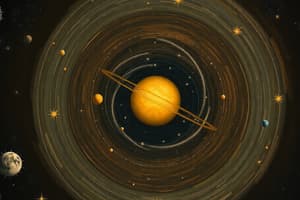Podcast
Questions and Answers
What shape is the orbit of a planet according to Kepler's laws?
What shape is the orbit of a planet according to Kepler's laws?
- Parabola with the Sun at the focus
- Spiral with the Sun at the center
- Ellipse with the Sun at one of the foci (correct)
- Circle with the Sun at the center
Which type of rock is formed from cooled magma or lava?
Which type of rock is formed from cooled magma or lava?
- Granular rock
- Metamorphic rock
- Sedimentary rock
- Igneous rock (correct)
What process allows sedimentary rock to form from deposits carried downstream?
What process allows sedimentary rock to form from deposits carried downstream?
- Melting of minerals
- Crystallization of minerals
- Erosion and compaction (correct)
- Volcanic activity
Which statement is true about clastic sedimentary rocks?
Which statement is true about clastic sedimentary rocks?
Which of the following is an example of an extrusive igneous rock?
Which of the following is an example of an extrusive igneous rock?
What characterizes foliated metamorphic rocks?
What characterizes foliated metamorphic rocks?
What condition is necessary for igneous and sedimentary rocks to transform into metamorphic rock?
What condition is necessary for igneous and sedimentary rocks to transform into metamorphic rock?
Which process describes the transformation of sedimentary and metamorphic rocks into igneous rocks?
Which process describes the transformation of sedimentary and metamorphic rocks into igneous rocks?
Which type of weathering involves producing smaller rock clasts that maintain the same chemical composition as the original?
Which type of weathering involves producing smaller rock clasts that maintain the same chemical composition as the original?
What is the most common product of chemical weathering?
What is the most common product of chemical weathering?
What process is NOT involved in weathering?
What process is NOT involved in weathering?
Which of the following statements is true regarding biological weathering?
Which of the following statements is true regarding biological weathering?
Flashcards are hidden until you start studying
Study Notes
Universe, Astronomy and Solar System
- The solar system consists of the Sun and celestial bodies including planets, moons, asteroids, comets, and meteoroids.
- Kepler’s Laws of Planetary Motion describe the movement of planets in their orbits around the Sun.
Kepler’s Laws of Planetary Motion
- First Law: Planetary orbits are elliptical, with the Sun located at one focus of the ellipse.
- Second Law: A line joining a planet to the Sun sweeps out equal areas in equal time intervals, indicating varying speeds in different parts of the orbit.
- Third Law: The square of a planet's orbital period is proportional to the cube of the semi-major axis of its orbit, establishing a mathematical relationship between distance and orbital time.
Geology
- The study of rocks and minerals is fundamental in understanding Earth's composition and processes.
Rocks Classification
- Igneous Rocks: Formed from solidified magma or lava.
- Intrusive Igneous Rocks: Example includes granite, which crystallizes slowly within the Earth.
- Extrusive Igneous Rocks: Example includes obsidian, formed from rapid cooling of lava above ground.
- Sedimentary Rocks: Developed from erosion and deposition of materials over time.
- Clastic Sedimentary Rocks: Created from inorganic debris, such as sandstone.
- Organic Sedimentary Rocks: Formed from the remains of living organisms, e.g., limestone and coal.
- Chemical Sedimentary Rocks: Originates from the precipitation of dissolved materials, like rock salt.
- Metamorphic Rocks: Produced when existing rocks are altered by heat, pressure, and chemical processes.
- Foliated Metamorphic Rocks: Feature visible layers or striations due to directional pressure; an example is slate.
- Non-foliated Metamorphic Rocks: Display irregular patterns with no layered appearance; marble is a notable example.
Rock Cycle
- Each rock type (igneous, sedimentary, metamorphic) can transform into another through specific geological processes.
- Igneous and sedimentary rocks become metamorphic rock when subjected to high pressure and heat.
- Sedimentary and metamorphic rocks can transition into igneous rock by melting back into magma.
- Igneous and metamorphic rocks can form sedimentary rock through the process of erosion.
Minerals
- Naturally occurring substances in the Earth, characterized by a definite chemical composition and structure.
- Over 3000 different minerals identified; some are rare gemstones (e.g., diamond), while others are common (e.g., quartz).
Weathering Processes
- A destructive process that alters rocks through exposure to different environments.
- Three main types of weathering: mechanical, chemical, and biological.
Mechanical Weathering
- Rocks are broken down into smaller clasts of the same composition.
- Fracturing occurs like a hammer, resulting in angular clasts.
- Abrasion functions like sandpaper, smoothing and rounding the rough edges of rocks.
Chemical Weathering
- Changes minerals chemically to achieve greater stability with surface conditions.
- Typically produces smaller pieces with different compositions, with clay being the most common outcome.
Biological Weathering
- Involves the influence of living organisms (plants and animals) on the weathering process.
- Acts in conjunction with mechanical and chemical weathering rather than being a standalone process.
Studying That Suits You
Use AI to generate personalized quizzes and flashcards to suit your learning preferences.




